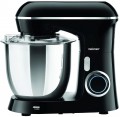Bowl capacity
The volume of the food bowl provided in the food processor. Most often the full volume is indicated, not the working volume. It should be noted that you can not use the bowl completely when cooking, the working volume is approximately 70% of the total. Thus, about 4 liters can be used in a 6 liter bowl. And if you go into the recipes and power modes of the food processor (see the instructions), then smaller numbers are acceptable for preparing a particular dish (kneading dough, mixing salad, etc.).
Note that a large capacity affects the dimensions and weight of the unit, and also requires a more powerful engine — which affects energy consumption and price. So when choosing a bowl by capacity, you should not chase the maximum capacity, but take into account the planned volumes of work.
Power
Rated power of the food processor. Most of this power comes from the engine — the rest of the unit consumes very little energy. Usually, the
more power, the higher the productivity of the unit, and the less time it takes to process products.
Note that the optimal power value directly depends on the volume of the bowl (see the relevant paragraph): for example, for a 1.5 kg bowl, at least 300 W is desirable, for a two-kilogram bowl — 400 W, a three-kilogram bowl — at least 700 W. And with the same bowl capacity, a more powerful unit will be more productive, it will work faster and better cope with high loads (for example, a full load). On the other hand, an increase in power affects energy consumption and price.
Number of speeds
The number of fixed speeds of rotation of the attachments provided in the design of the food processor. The more of them, the more accurately you can choose the required speed for each specific mode of operation. It is worth noting that some devices do not have fixed speeds — the control is carried out smoothly (see Stepless speed controller)

